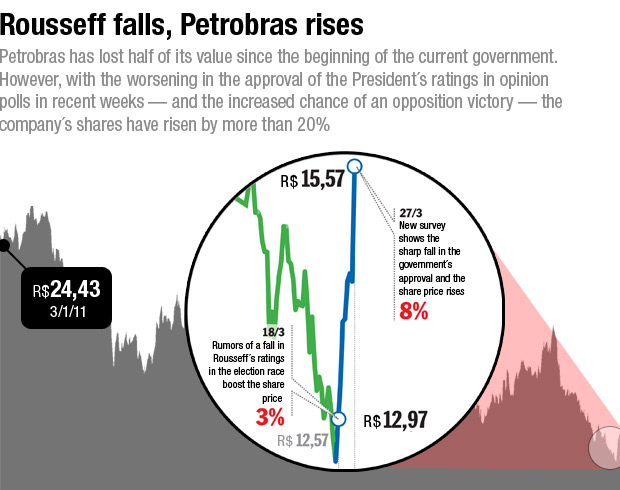Petrobras takes a fall
The company´s market value has fallen by almost half since President Rousseff took office and has become symbolic of her bad management

The only thing that stops the Petrobras crisis from matching the definition of a perfect storm against the government is that the 2014 presidential campaign has still not begun and there is a World Cup separating today´s Brazil from the one that goes to the polls in October. Six months is an eternity in politics and what it looks like a cyanide pill for Dilma Rousseff ´s re-election plans today could be diluted until it ends up as just a bad taste, unpleasant but digestible by public opinion. At least, this is what the government is hoping for. The opposition, on the other hand, hopes that the wells of scandals around Petrobras will be deeper and richer in providing increasingly more toxic news for Rousseff and her candidature.
 Last week was disastrous for the two Rousseffs, the president and the candidate, who the voter confuses. This confusion is good when things are going smoothly and bad when the incoming tide turns very strong. This is the case of Dilma Rousseff at this moment. Everything seems to be conspiring in a coordinated way against the President and, astonishingly, she herself drew attention to the episode of the purchase of the Pasadena refinery that has become synonymous with a loss of one billion dollars for Brazil in public opinion.
Last week was disastrous for the two Rousseffs, the president and the candidate, who the voter confuses. This confusion is good when things are going smoothly and bad when the incoming tide turns very strong. This is the case of Dilma Rousseff at this moment. Everything seems to be conspiring in a coordinated way against the President and, astonishingly, she herself drew attention to the episode of the purchase of the Pasadena refinery that has become synonymous with a loss of one billion dollars for Brazil in public opinion.
The Pasadena case seemed lost amongst the layers of other government failures that, although more destructive, were easier to explain and, therefore, more difficult for the opposition to exploit in electoral terms. We are talking here about the hole of hundreds of billions of Reais dug from the energy sector as a result of Rousseff s populist attempt to force the companies to provide electricity at a price below the production cost and Petrobras to import expensive gasoline and sell it at a cheaper price to the distributors. Compared to the loss produced by the disastrous policy of artificially fixing electricity and gasoline prices, the loss of the purchase of the Texas refinery is small beans. Petrobras has lost the equivalent of 80 Pasadenas in market value and 30 Pasadenas in financial losses as a result of the gasoline and diesel subsidies. The state-owned electricity group Eletrobras has lost almost seven Pasadenas in market value.
One view being circulated is that Rousseff´s strategy was to re-open the Pasadena case now and, by doing so, reduce the opposition´s ability to exploit it in the electoral campaign debates. If this was the case, she has shot herself in the foot, then in the chest and, who knows, dealt herself a coup de grâce. The scandals involving Petrobras were omens of investors´ judgment on Rousseff´s ability to govern. The sentence was hard and can be summed up in the following equation: the more Rousseff falls in the opinion polls, the more the market´s willingness to invest in Brazil rises. A poll by the CNI/Ibope organization announced last week showed a fall of seven percentage points in the government´s approval rating. The immediate result was a day in which the Brazilian stock market, the Bovespa, rose sharply (3.5%) with extraordinary gains for shares in Petrobras (8%), Eletrobras (10%) and Banco do Brasil (6%). The market´s message was unambiguous and crystal clear: the government is not part of the solution, the government is the problem. Ricardo Corrêa, director of the Ativa Corretora brokerage, said: “Without the political interference by the government, Petrobras and Eletrobras are investments with enormous potential. Petrobras will become one of the biggest oil companies in the world in a few years.”
The immediate sentence by the stock market to reproach Rousseff´s government was accompanied by an equally negative judgment of the president´s view of economic issues. “It is wrong to see this as an arm-wrestling contest between a popular government and a financial casino that is only interested in an easy profit that brings no social benefits. This is an ideological and short-sighted view. The hostility to the market holds back investments, impoverishes the country and reduces the supply of highly skilled jobs,” warns the Letter to the Reader in this issue of VEJA. The Rousseff´s government main idea has been that business leaders, by definition, are people with enormous ambition who only think of accumulating fortunes at the cost of exploiting the people and getting easy access to the public coffers.

FRONT LINE – Aécio Neves was the main coordinator of the creation of the Congressional investigation committee into Petrobras; he now wants to use it to raise his profile among the electorate (Pedro Ladeira/Folhapress)
The equation “Rousseff falls, the stock markets rises” reflects investors´ dissatisfaction with this simplistic idea the government has. The investor certainly wants a profit but to obtain it in a healthy business environment, marked by fair competition and sensible government regulation. By doing so, the investor increases the national wealth, creates skilled jobs and even boosts tax revenues. Last week´s reactions show that in October voters will weigh up the feeble results of Rousseff´s statist and interventionist management of government and the more modern and upbeat proposals by Aécio Neves from Minas Gerais state and Eduardo Campos from Pernambuco state. When they were governors of their own states, Aécio Neves and Eduardo Campos went in the opposite direction from Rousseff in everything and not only obtained great popular support but an attractive looking and undeniable stock of public policies of the highest quality. The opposition will present the elector during the presidential campaign with the results obtained from transparency and meritocracy. These point to restoring greater powers to the regulatory agencies, the end of interventionism in the economy and the return to planning and partnerships with the private sector. Finally, the opposition will feed on the mistakes and scandals of the last 12 years of this government that is driven by ideology and policies to make people dependent on the state at home. Abroad, it has made Brazil´s foreign policy subordinate to the interests of Argentina, Venezuela and Cuba.

OVERBILLING – The government fears the investigations of judge José Jorge of the Federal Accounts Court on the controversial purchase of the Pasadena refinery (Cristiano Mariz)
President Rousseff has reacted and is trying to rebuild bridges with business leaders and bankers to regain the lost credibility. At the same time, she will have to respond to the corruption within Petrobras and deal with the possibility of a Congressional committee investigation (known as a CPI) to scrutinize the contracts signed by the company. “The situation is out of control. It will be very difficult for the Planalto (government) to control the process,” said a presidential advisor. The government may disdain the Congressmen´s investigative ability but it fears the work being carried out by the auditors of the Federal Accounts Court (TCU), under the coordination of judge José Jorge. This group has information that the price of the Pasadena refinery was artificially increased. It was precisely this concern with the TCU that led Rousseff to step forward two weeks ago and explain that, in her position as chairwoman of the board of Petrobras at the time of the purchase, she had only approved the deal based, as is normal in these cases, on a summary executive that omitted clauses that were damaging to Petrobras. However, she still will have to explain why, on becoming aware of the Pasadena mess in 2008 when she was President Luis Inácio Lula da Silva´s Chief of Staff, she did not stop the transaction, order an investigation or check whether those responsible had been punished.
There is no doubt that Petrobras is going to be one of the issues, if not the main issue, of the electoral campaign in 2014. For the moment, it is providing the opposition with more ammunition every day. One of the company´s former directors, Paulo Roberto Costa, is being held in prison by the Federal Police suspected of money laundering. Another director, Nestor Cerveró, has been fired for contradicting President Rousseff´s version of the Pasadena purchase. Petrobras is carrying out an internal investigation of director José Antônio de Figueiredo and his predecessor, Guilherme Estrella, who are suspected of receiving bribes from a Dutch supplier of Petrobras.
Petrobras announced its own investigation of the Pasadena purchase last week, almost six years late. As VEJA revealed in its last edition, the then general procurator of the Finance Ministry, Luís Inácio Adams, sent an e-mail in July 2008 to the then executive secretary of the Chief of Staff´s office, Erenice Guerra, who was Rousseff´s right-hand woman at that time. Adams highlighted in his message the fact that the executive board had opened an audit to identify those responsible for the “procedural fault” and investigate any damages from the purchase of the refinery. The audit was never opened.

POWERFUL – Former Petrobras director Paulo Roberto Costa, currently held in prison by the police under suspicion of paying and receiving bribes and money laundering, maintained a direct link with politicians in Brasília (Jonathan Campos/Ag. Gazeta do Povo)
The Rousseff government blames the Lula government for this and claims that the former executive board acted in a corporate way to protect its own members. The fact is that it is not only the names of the executives who were involved that is in play but also interests related to leading politicians. The godfathers of the former Petrobras executives include the Senate chairman, Renan Calheiros, and Lula´s former Chief of Staff, José Dirceu, who is currently imprisoned for his role in the bribes-for-votes scandal known as the “mensalão”. Paulo Roberto Costa, for example, looked after the interests of a confederation of political parties (see interview below). He was initially nominated by José Janene (Progressive Party) also involved in the “mensalão”, and began to provide services to Senators from the Democratic Movement Party (PMDB) and Congressmen from the Workers Party (PT). (Note: Under Brazil´s political system, senior management at state-controlled enterprises, like Petrobras, are often nominated by political parties and in some cases are even members of the party.)
This group tried to keep him in Petrobras but was overturned by CEO Graça Foster who fired him after saying behind the scenes that he had “indulged himself” in the position. Paulo Roberto Costa not only played a decisive part in the Pasadena refinery purchase operation but was a leading player in the project to build the Abreu e
Lima refinery in Pernambuco. He was the main Petrobras executive overseeing the work, the budget of which jumped from US$ 2.5 billion to US$ 20 billion. This is also an opportunity for the opposition to prospect for high value energy reserves in the election. One question for Rousseff and Lula is why they refused a proposal by Saudi Arabia to build the Abreu e Lima refinery and finance 100% of the cost of the project. Instead of a secure and transparent offer from Saudi Arabia, the PT government opted for a kind of South American solidarity adventure by building the refinery in partnership with the Venezuelan state-owned oil company PDVSA and the late President Hugo Chávez. PDVSA later pulled out and left the Brazilian government on its own with the deal that became the overbilling scandal the Federal Police is now investigating. On dismantling a billionaire money laundry scheme, the Federal Police discovered that the currency broker Alberto Youssef acted as a financial operator for Costa. He was so devoted to his job that he registered the receipt of a “commission” of R$ 7.9 million in a spreadsheet, money the police claim was paid by Camargo Corrêa. The construction company is one of those responsible for the Abreu e Lima refinery project. Costa is believed to have benefited from at least part of this bribe.
Another Petrobras deal is being looked at by the Federal Police. An inquiry was opened this month to investigate the sale by Petrobras of the San Lorenzo refinery in Argentina in 2010 for US$ 110 million. However, a lobbyist and former director of Petrobras, João Augusto Henriques, who is linked to the PMDB party, claimed that R$ 10 million of this amount went to go-betweens who passed on at least R$ 5 million to Congressmen from the party. This case has led to some apprehension in Congress against the backdrop of the eternal battle between the PT and PMDB. “It is a conversation between Mafioso, with a revolver on the table. If the PMDB wants to create a problem, we will tell who has benefited from every operation,” said an influential PT member.
Among those most scared of the investigation of irregularities in Petrobras and its related developments is Congressman André Vargas (PT), vice-chairman of the House of Representatives. The Federal Police has already discovered that he and Paulo Roberto Costa had a close relationship with the currency broker Youssef who would launder the bribes received from the Petrobras works. Vargas and Youssef are friends. They live in the same city (Londrina, Paraná state) and talked frequently, according to the agents. Through cellular and telephone messages, they arranged meetings in airports, filling stations and even in the Congressman´s home. Vargas, would you believe, claimed that he was giving advice on finance and investments to his friend even though Youssef is a well-known expert in this area and whose name has figured in police cases for more than a decade. “He contacted me to assess investments, collect information, and swap ideas.” It is this kind of promiscuousness that concerns the President and stirs the opposition. Aécio Neves has never had as much national visibility as now, a moment in which he is coordinating the Congressional investigation on Petrobras. The downgrading of Brazil´s credit rating and the scandals around Petrobras have enlivened Eduardo Campos. In the program of his Brazilian Socialist Party (PSB) shown on the national TV network last Thursday, he praised the social democratic PSDB party for the economic stability it brought and the PT for its social inclusion. However, he attacked the Petrobras management, the bad way the economy is being run and appointments by political parties to positions in state-controlled enterprises and agencies. He watched the program with allies and was satisfied. “I am going to win this election and if Dilma continues to help me, I will win in the first round.”
With additional reporting by Alana Rizzo and Marcelo Sakate
“Problems” and “solutions”
Adriano Ceolin
The former ministry for Cities in the Rousseff government, Congressman Mário Negromonte (PP-BA), says former Petrobras director Paulo Roberto Costa, held in prison by the Federal Police, was a man above any suspicion. He was pleasant and frequented the homes of PP leaders in Brasília, the party responsible for his nomination. He was attentive and listened to the “problems” of some Congressmen, helpful and always “available”. This combination of virtues made the former director a special figure who was courted…

REALLY?!… – Mário Negromonte:Meetings with the former director of Petrobras served at most to solve problems of Congressmen who owned filling stations (André Coelho/Ag. O Globo)
How was the relationship between Paulo Roberto and the PP?
Paulo Roberto was nominated at the time by (José) Janene
(former PP leader who died in 2010). However, Paulo Roberto had a very good relationship in the Congress with all the political parties,
PMDB, PT, PP…
How did this relationship arise?
He was in charge of a very important division. There were many interests. Everybody had a problem.
Problem?
For example, there was one Congressman who had a filling station. Another had an alcohol plant. This meant we had a direct contact in Petrobras to talk to.
But he is now in prison…
This came as a very unpleasant surprise to us. Nobody expected anything like this to happen.
Who was the main person Paulo Roberto spoke to?
President Lula was the person who had direct contact with him. This is what we know.
Where were these meetings with the former director held?
Here in Brasília. I was only at Petrobras once. There were meetings in the homes of Congressmen José Janene (Parana), João Pizzolatti (Santa Catarina) and Luiz Fernando (Minas Gerais). I think Paulo Roberto may have come to my house. I am not somebody who gives lots of parties.
And what did you discuss in these meetings?
It was a chat, to show prestige and that we had a director. It was nothing specific. He also visited the homes of other Congressmen, from the PMDB, PT.
What party had greatest hold over him?
There was an argument with the PMDB, which said it was his godfather. The argument was with Renan (Calheiros), Eduardo Cunha, Henrique Eduardo Alves.
Were they fighting to see who the godfather was?
Because of the power.
Petrobras at the bottom of the well
The corrupt suspects in Brazil´s biggest company
 SBM
SBM
An audit of the Dutch company, that makes offshore oil exploration platforms, detected payments of bribes of US$ 30 million in Brazil to obtain Petrobras contracts amounting to more than R$ 9 billion
 Pasadena
Pasadena
Petrobras bought the half of a refinery for US$ 360 million in 2006 although it had been sold for only US$ 42.5 million a year previously. A legal argument with the partner, the Belgium company Astra Oil, raised the cost of the deal to more than US$ 1 billion
 San Lorenzo
San Lorenzo
The Federal Police opened an inquiry to investigate an allegation that the sale of the refinery in Argentina, for US$ 110 million, included a commission payment of US$ 10 million to lobbyists who brokered the deal – of which US$ 5 million would go to PMDB politicians who had filled positions in the state-controlled company
 Abreu e Lima
Abreu e Lima
This refinery construction project in Pernambuco state was initially budgeted at US$ 2.5 billion but this has now risen to US$ 20 billion and is being investigated by the Federal Accounts Court (TCU) on suspicion of overbilling. The former Petrobras supply director, Paulo Roberto Costa, was granted total powers to oversee the work. He was imprisoned the week before last and the Federal Police is investigating whether he received bribes through a currency trader
Fotos Agência Petrobrás e Yasuyoshi Chiba/AFP



 SEGUIR
SEGUIR
 SEGUINDO
SEGUINDO
 Após ser cassado e preso, ex-deputado Eduardo Cunha tenta voltar à Câmara
Após ser cassado e preso, ex-deputado Eduardo Cunha tenta voltar à Câmara Autoridade aérea dos EUA alerta para possível ‘atividade militar’ no México e América Central
Autoridade aérea dos EUA alerta para possível ‘atividade militar’ no México e América Central Corinthians x São Paulo no Paulistão: onde assistir, horário e escalações
Corinthians x São Paulo no Paulistão: onde assistir, horário e escalações A reação de auditores da Receita ao novo inquérito de Moraes sobre violação do sigilo de ministros
A reação de auditores da Receita ao novo inquérito de Moraes sobre violação do sigilo de ministros O estranho comportamento de Lula quando o assunto é a disputa eleitoral
O estranho comportamento de Lula quando o assunto é a disputa eleitoral

















